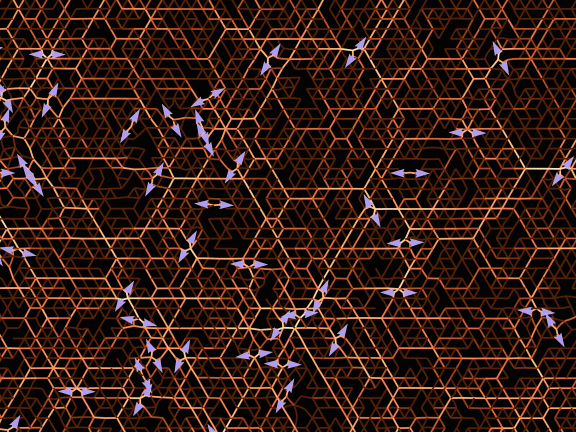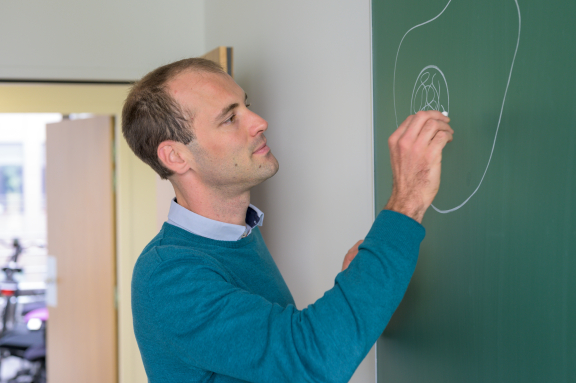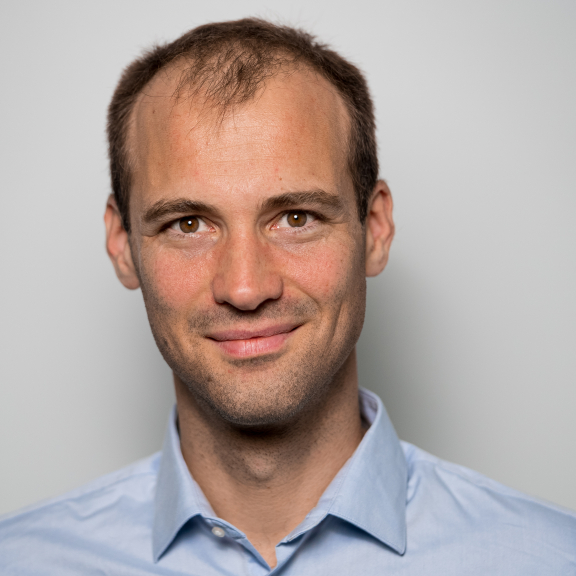Martin Lenz How do proteins manage their frustration?
Martin Lenz, CNRS research director, Theoretical Physics and Statistical Models Laboratory, Orsay, France, and Physics and Mechanics of Heterogeneous Media Laboratory, Paris, France
- 2022 • Impulscience


©Alexandre Darmon/Art in Research pour la Fondation Bettencourt Schueller

Self-assembly is crucial for cells because it allows individual components to be assembled into functional biological structures such as proteins. Sometimes, poorly assembled proteins clump together and form fibers that contribute to disease. Martin Lenz wants to understand the physical principles underlying the frustrated self-assembly involved in the fibers’ formation, which remain largely unknown.
Self-assembly organizes proteins inside cells.
Proteins in our cells constantly self-assemble to form functional structures. They can create the molecular machines responsible for the production of new proteins, viral capsids and the components of the cell's skeleton, whose structures have been optimized over millions of years of evolution. In some diseases, such as Alzheimer's, proteins with complex non-optimized shapes also self-assemble. Surprisingly, given their disparate shapes and interactions, they form relatively well-defined structures: fibers. Martin Lenz will study the molecular mechanisms underlying this phenomenon, which he calls "dimensional reduction".
Understanding the origin of frustration in protein assembly
If the self-assembly of a set of objects (molecules or small particles) that attract each other but do not fit together perfectly is observed, the resulting aggregates contain misaligned or distorted components. As they are assembled, the initially small misalignments between the first objects accumulate. Newly arrived objects encounter a more constrained environment than their predecessors. During the self-assembly process, geometric frustration accumulates and further assembly is impeded. Preliminary work by Dr. Lenz's team suggests that the aggregates form fibers, "dimensional reduction", to escape frustration. New theoretical and experimental tools must be developed to understand the role of frustration in the self-assembly of complex irregularly shaped objects, including proteins.
Discovering new principles underlying fiber formation in certain diseases
Impulscience supports Dr. Lenz and his team’s work to prove that dimensional reduction is a general principle of self-assembly. To do that, they will develop new theoretical methods on the properties of complex particle assemblies. They will use high-resolution 3D printing and X-ray scattering to probe the self-assembly of colloids (microscopic particles suspended in a liquid) and proteins, allowing them to discover the formation mechanisms. Their work will reveal new principles of how matter is organized. It is a fundamental step forward in the understanding of protein-like objects that will lead to a better understanding of biology and certain diseases. It could also have an impact on engineering objects at the nanometric and microscopic scale, contribute to better control of the manufacturing processes of certain drugs and optimize protein crystallography methods.
Martin Lenz in a few words
Martin Lenz is a physicist who discovered biology during his master's studies. After a physics PhD in 2009 and a post-doctoral fellowship in Chicago in 2012, Dr. Lenz obtained a CNRS research position at the Theoretical Physics and Statistical Models Laboratory at the University of Paris-Saclay. Since 2018, he has also been a researcher at ESPCI in Paris. He became president of the French Physical Society’s Physics and Life Sciences division in 2022. Although he defines himself as a theorist, he works closely with experimentalists, which allows him to make contributions that significantly describe biological systems. His work has been supported by the ERC (Starting Grant, 2015) and recognized by prizes in both fundamental statistical physics (International Union of Pure and Applied Physics Young Scientist Prize) and molecular biology (EMBO Young Investigator Award).

Impulscience
Impulscience allocates 7 new grants each year to researchers in the life sciences. Focused on the mid-career, this program aims to support this crucial stage for the development of research projects.
All the award-winnersCall for applications
Online applications open on February 17, 2025 and close on April 7, 2025, for candidates who have responded to ERC Starting or Consolidator 2024 calls or June 23, 2025, for candidates who have responded to ERC Advanced 2024 call.







